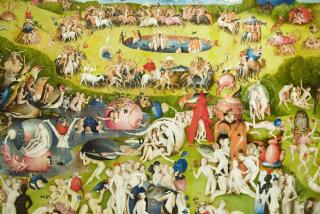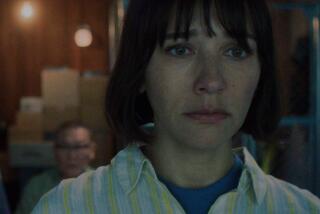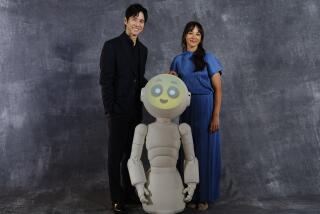The Silicon Valley of ‘Devs’ is years away. Here’s how its tech compares with reality
LONDON — Science is at the heart of all Alex Garland’s work, but the writer-director is less interested in erudite theories than he is in what those theories reveal about humanity itself. After Garland’s directorial debut, “Ex Machina,” came out in 2014, he started circling the idea of quantum mechanics, reading about the subject in science journals and watching online lectures by physicists like David Deutsch and David Wallace. That growing obsession has resulted, years later, in “Devs,” a self-contained, eight-episode series for FX on Hulu, which Garland pursued after making “Annihilation” in 2018.
“What tends to happen with me is that I get interested in a particular subject and then at some point a story just overlays itself over that subject,” says Garland, sitting on the set of “Devs” last year in London. “The point of being interested in a subject often goes on for years, and the story arrives later. Quite often when the story arrives, it comes fully formed — it’s like a whole narrative just drops down onto it. That’s exactly what happened with this one.
“This idea stemmed from whether we live in a deterministic universe or a nondeterministic universe — a deterministic universe meaning a universe where everything is a result of a prior cause. And the philosophical implication for that is that it removes free will. If that’s true, that’s quite a big deal. It makes you re-think behavior, which means you re-think relationships and actions, things that one has done right or wrong.”
Garland wrote and directed all eight episodes, which follow a coder named Lily Chan (Sonoya Mizuno, who also appeared in “Ex Machina”) who works for a Silicon Valley tech company called Amaya. A series of events leads Lily deeper and deeper into the secretive lab housed on the Amaya campus, known as Devs — short for “development.” To say too much about the plot would ruin the unfolding narrative, but it’s enough to know that Devs houses a powerful quantum computer that has the potential to change our understanding of the universe. Nick Offerman plays Amaya’s chief executive, a man with dubious intentions, and Alison Pill embodies his severe right-hand woman, Katie.
Although the show is set in the present day, the technology depicted therein reflects some supposition, pushing past what’s currently possible.
With “Devs,” set in Silicon Valley, the writer-director of “Ex Machina” and “Annihilation” poses big questions — with mixed results.
“It’s got something in common with ‘Ex Machina’ in that it’s sort of 10 years into the future,” Garland notes. “It allows for a big breakthrough, specifically in terms of computing, which is a thing that is currently being worked on… It could really happen in the same way ‘Ex Machina’ could really happen. Which is to say it probably couldn’t happen, but something like it could happen. So maybe not that exact thing, but something very substantially important could easily flow from quantum computers.”
The director, along with Mizuno, visited Google’s quantum computer lab in Goleta, Calif., ahead of shooting and did extensive research while writing. He found the YouTube series “PBS Space Time With Dr. Matt O’Dowd” helpful in breaking down the subject. Garland spoke with people in Silicon Valley, including coders in the quantum labs. Which means that the series is in some ways accurate to contemporary American tech companies. But in terms of quantum computers, of which there are an undetermined number in existence, “Devs” hovers in a fictional space.
“The people who are doing what quantum computers are doing are not remotely interested in trying to do the things talked about in ‘Devs,’ nor would they be able to,” Garland says. “This is a speculation, a bit like the way ‘Ex Machina’ speculates on a level of artificial intelligence that we’re not even close to achieving. It’s more that there are underlying principles [in effect].”
Garland was also interested in the state of private tech companies, modeling Offerman’s character, Forest, after an aging NoCal hippie, beard and all. The director is skeptical of anyone who is put on a pedestal like Steve Jobs or Mark Zuckerberg, because tapping into the tech bubble doesn’t necessarily make you a scientific genius. It might just mean you were in the right place with the right thing at the right time.
It’s got something in common with “Ex Machina” in that it’s sort of 10 years into the future.
— “Devs” creator Alex Garland
“There’s a line in the show where Forest is described as a genius and then someone says, ‘He’s not a genius, he’s an entrepreneur,’” Garland says. “I was interested in the idea that we ascribe genius-like qualities to the people who run tech companies. I was thinking, ‘I’m not sure that’s true.’ I’m inherently skeptical of anything that gets deified, but also because it seemed reasonably apparent to me that some of these people are not geniuses. They are entrepreneurs. I was riffing off that. I got quite hung up on an idea that Silicon Valley was much more capitalist than we tend to see it as.”
For Offerman, who jumped at the chance to work with Garland, Forest represents the nebulous sort of character who is vastly more interesting than one who is simply a villain.
“As the eight episodes unfold, your idea of ‘Who are the protagonists and who are the antagonists?’ becomes really murky,” Offerman says. “Which is really interesting, because I think that’s true of real life. Especially in this crazy political climate we want everything to be really polarized. Is it right or is it wrong? Are you an [expletive] or are you a Democrat? … You eventually come to learn why [Forest] does what he does and it’s pretty understandable. While you may or may not agree with his methods, you can have some empathy.”
Mizuno felt similarly about her character. “Lily is surprising,” she says. “She’s an outsider. She doesn’t do everything everyone else does. She doesn’t participate in groupthink the way most people do.”
Pill, who wanted to study quantum mechanics after high school thanks to reading Gary Zukav’s “The Dancing Wu Li Masters,” found “Devs” compelling because it allowed for deeper thoughts than the average TV series. She read extensively ahead of production, including “A Briefer History of Time” and David Foster Wallace’s “Everything and More: A Compact History of Infinity,” and has continued to consider the philosophical ramifications of quantum computing ever since.
“Having been unpracticed in thinking about these things, it was such a gift to be given a project that asks these questions,” she says. “Because I think people like thinking about this stuff. We forget sometimes we have so much magic around us regularly … The challenge Alex poses to his viewers is one that’s not ‘You’re going to be overwhelmed by the science.’ It’s ‘You’re going to be overwhelmed by existence.’”
“Alex has a predilection for examining our amazing ability to create technology and further explore the vast reaches of physics,” Offerman adds. “And then, naturally, the trouble that gets us into. The great dichotomy of bipedal primates being handed a smartphone: On one hand, you can do amazing things with it. And on the other hand, you can send pictures of your genitals to your intern and get in a lot of trouble.”
Ultimately, “Devs” asks a lot of questions, but it does so in the context of a story about a group of individuals who are personally affected by the science and technology. Garland keeps it personal, because he feels that these sorts of lofty issues are inherently personal, affecting each of us as technology advances and private tech companies grow. For him, science is an entry point for a discussion of what it means to be alive. The series can’t offer any real answers, but it can allow viewers to consider what those might be.
“[Science is] seen as something which is dry and boring and hard to understand and thinks it has all the answers — and all of those things are the opposite of what is actually the case,” he says. “Most scientists will talk more about what they don’t know than about what they do know. Science contains not just philosophy but also poetry.”
More to Read
The complete guide to home viewing
Get Screen Gab for everything about the TV shows and streaming movies everyone’s talking about.
You may occasionally receive promotional content from the Los Angeles Times.






